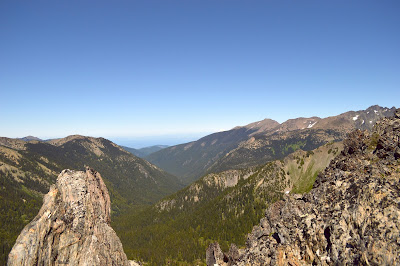 |
| Cedar Lake Campsite from across the water |
Great weather on the morning of day six. The team decided that we would spend another day at Cedar lake. We were given a choice to either reflect or go on another ridge hike. About half the group decided to reflect and the other half went on the ridge hike. I joined the ridge hike group and it was very worth it. The ascent was riddled with marmot holes. The views at the top were again spectacular and we got 360 degree panoramas of the Olympics. We could also see all the way to Puget Sound and even to the Cascades. The atmospheric clarity is a testament to the great air quality of Washington.
We descended and enjoyed some more lakeside
pleasantries. I tried fishing and failed
again but was a bit more competent.
Anren was a good teacher.
After dinner I lead my discussion and it went ok. I felt a bit unorganized and scatterbrained
during the whole affair and didn’t get a huge response. It was disappointing and I felt underwhelmed
by my performance. Nevertheless, it was ok and I
still got to read some great passages from The
Call of the Wild. I focused on
Thoreau’s monumental statement “In wildness is the preservation of our
world.” I reasoned that this was
ambiguous but that generally there are three main ideas that I think he is
focusing on. The first and most obvious
is resources. The second is psychological
preservation. And the final is more
ambiguous but I think he means environmental health as a whole. The resource aspect is very straightforward:
resources from the wild sustain us.
Psychologically, I believe he is referring to the benefit nature has on
our mental well-being. The essay
mentions several times the benefits he received from going on long walks
through nature and often times he claims that all humans seeking total health
should visit nature regularly. He also
states the wildness in character is something to be admired in humans. I think that he is implying that as a species
we should not let ourselves become too “soft” or disconnected from wild
ancestry. I believe this is a
warning. It is not invalid either
because it is arguable that part of the lack of environmentalism in our culture
is the result of disconnection from our more natural roots. Finally, I think that he is referring to the
preservation of natural habitats in their raw state is the only real path for
ecosystem health. There is a great deal
of truth in this. I finished the
discussion by reading several passages from The
Call of the Wild that I felt applied to our trip. These were about the main character, Buck a
large sled dog, who experiences a resurgence in his wild ancestry when he is
stolen from his domesticated life and thrown into dog sled work. The call of his ancestors reawakens within
him as he adjusts to his new life. His
instincts are rekindled and his body undergoes a dramatic transformation from
soft to tough. I felt that in our brief
time amongst the Olympics we were feeling some of these things slightly as
well. This idea got a mixed reception
and I doubt my peers were really all that convinced. I felt like I was definitely more attuned
with my senses but maybe it was my imagination running wild inspired by the
story.
The pack decided that we would make a longer day out of
tomorrow and return to our first campsite.
Everyone crashed early to prepare for day myself included.





No comments:
Post a Comment